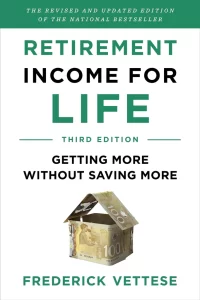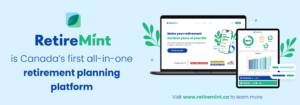
By Michael J. Wiener
Special to Financial Independence Hub
Actuary Frederick Vettese has a third edition of his excellent book, Retirement Income for Life: Getting More Without Saving More.
He explains methods of making your retirement savings produce more income over your entire retirement.
These methods include controlling investment fees, optimizing the timing of starting CPP and OAS pensions, annuities, Vettese’s free Personal Enhanced Retirement Calculator (PERC), and using reverse mortgages as a backstop if savings run out.
This third edition adds new material about how to deal with higher inflation, CPP expansion, new investment products as potential replacements for annuities, and improvements to Vettese’s retirement calculator PERC. Rather than repeat material from my review of the second edition, I will focus on specific areas that drew my attention.
Inflation
“We can no longer take low inflation for granted.” “An annuity does nothing to lessen inflation risk, which should be a greater worry than it was before the pandemic.” “We could have practically ignored inflation risk before COVID hit but certainly not now.”
It’s true that inflation is a potential concern for the future, but it’s wrong to say that it was okay to ignore inflation in the past. Not considering the possibility of inflation rising was a mistake many people made in the past. We were lulled by many years of low inflation into being unprepared for its rise starting in 2021, just as many years of safety in bonds left us unprepared for the battering of long-term bonds when interest rates rose sharply.
Inflation risk is always present, and financial planners who have treated it as a fixed constant were making a mistake before inflation rose, just as they would be wrong to do so now. This underappreciation of inflation risk is what causes people to say that standard long-term bonds (with no inflation protection) are safe to hold to maturity. In fact, they are risky because of inflation uncertainty.
People’s future spending obligations are mostly linked to real prices that rise with inflation, not fixed nominal amounts. The uncertainty in future inflation should be respected just as we respect uncertainty in stock market returns.
Maximizing retirement income
Vettese does a good job of explaining that things like CPP, OAS, and annuities provide more income now because they offer your estate little or nothing after you die. To make full use of this book, you need to understand this fact, and “you have to commit to the idea that your main objectives are to maximize your retirement income and ensure it lasts a lifetime.”
Spending shocks
Retirees should “set aside somewhere between 3 percent and 5 percent of their spendable income each year, specifically to deal with spending shocks.” “This reserve might not totally cover all the shocks that people … might encounter, but it will definitely soften their impact.”
It’s easy to plug a smooth future spending pattern into a spreadsheet, but real life is much messier than this. I’ve seen cases of retirees choosing to spend some safe percentage from their savings while also expecting to be able to dip in anytime something big and unplanned for comes up. This is a formula for running out of retirement savings early.
Retirement income targets
In this third edition, Vettese assumes that retiree spending will rise with inflation until age 70, then rise one percentage point below inflation during one’s 70s, two percentage points below inflation from age 80 to 84, then 1.8% below at 85, 1.6% below at 86, 1.4% below at 87, 1.2% below at 88, 1% below at 89, and rising with inflation again thereafter.
This plan is based on several academic studies of how retirees spend. I don’t doubt the results from these studies, but I do have a problem with basing my plan exclusively on the average of what other people do. The average Canadian smokes two cigarettes a day. Does that mean I should too?
The academic studies mix together results from retirees who spent sensibly with those who overspent early and were forced to cut back. I don’t want to base my retirement plan partially on the actions of retirees who made poor choices. Similarly, I prefer to base my smoking behaviour on those Canadians who don’t smoke. Continue Reading…




